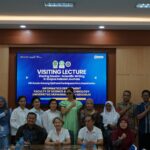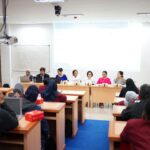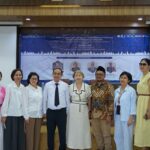Location: A.K. Kussayinov Eurasian Humanities Institute, Astana, Kazakhstan
Date: 21 November 2024
Interviewer: Abayeva Akniyetnessibeli from A.K. Kussayinov Eurasian Humanities Institute Media
Interviewer: Good afternoon, Mochammad Tanzil Multazam. It is a privilege to welcome you today. Your outstanding achievements as a Director of the Library at Universitas Muhammadiyah Sidoarjo, editor of a Q3 law journal, founder of the Silkroad Research Network, and co-founder of Relawan Jurnal Indonesia are truly remarkable. We have prepared some questions and are excited to hear from someone who has made such significant contributions to academic research and international collaboration. Let’s begin with a few questions to learn from your experience and vision.
Interviewer: Collaboration is key to progress in the academic world. How do you envision the possibilities for partnerships between our universities?
Mochammad Tanzil Multazam: Thank you for the opportunity. The collaboration between our university and Central Asia actually started in 2020 with Uzbekistan. We aim to expand this collaboration to other regions. My vision is that Central Asia holds immense potential as the historic center of global knowledge. The region’s legacy—from Samarkand to Kazakhstan—has deeply influenced civilizations, including Indonesia.
In the future, I see Central Asia emerging as a leader in scientific development. The region is regaining its scientific prowess, lost during the Soviet era. Today, countries like Uzbekistan are experiencing rapid development. For instance, in a short time, Uzbekistan’s GDP and other economic indicators have risen significantly. In the next 10 years, I foresee tremendous growth. We aim to establish stronger collaborations with this “sleeping giant” to uncover new opportunities.
Interviewer: Thank you for your answer. We appreciate your deep understanding of our history. The second question is: as an educator and leader, what guidance would you offer to students building their academic and professional paths?
Mochammad Tanzil Multazam: For students, I recommend adhering to three pillars: transparency, honesty, and accountability. In every action—whether collaboration, discussions, or projects—you must uphold these principles:
- Transparency: Ensure your work and intentions are clear and open.
- Honesty: Never compromise on truth. Academics can make mistakes but should never lie.
- Accountability: Measure the impact of your actions and take responsibility for them.
By following these principles, you can build a strong foundation for success.
Interviewer: The Silkroad Research Network is an inspiring initiative. Could you share the story of how it began and the objectives you aim to achieve through this platform?
Mochammad Tanzil Multazam: Certainly. The idea for the Silkroad Research Network originated from my appreciation of Central Asia’s historical role as a knowledge hub. For example, the scholars of Samarkand significantly influenced Indonesia. Many scholars from Central Asia, particularly during the golden age of Islam, taught Indonesians valuable knowledge—ranging from practical skills to spiritual teachings.
Take the example of Syekh Ibrahim Asmoroqondi, whose teachings have left a lasting impact on Indonesia. His tomb in Desa Gesik, Tuban, is visited by tens of thousands of pilgrims daily. Syekh Ibrahim was also the father of Raden Rahmat, better known as Sunan Ampel, one of the Walisongo who played a crucial role in spreading Islam in Java. This cultural and intellectual connection inspired me to create the Silkroad Research Network to revive and celebrate this shared legacy. However, in Samarkand today, many historical scholars remain underappreciated, even by the local community. By fostering research and collaboration, the network aims to rekindle this rich history and its relevance for modern times.
Interviewer: Thank you for sharing this enlightening story. My final question is: publishing in reputable journals is a significant challenge for many researchers. What strategies or advice would you share with those aspiring to publish in Q3 or higher-level journals?
Mochammad Tanzil Multazam: The journal’s Q-level should not define its quality. Rankings like Q3 or Q1 are based on metrics like citation counts, which can fluctuate. Focus on producing honest, transparent, and accountable research. Here are my recommendations:
- Avoid Plagiarism: Plagiarism is a clear violation of academic integrity.
- Be Transparent: Share accurate data and ensure your methodology is sound. For example, if you claim to survey 1,000 people, ensure this is true.
- Cite Responsibly: Only reference works you have read and understand.
By adhering to these principles, you can build credibility and ensure your research makes a genuine contribution.
Interviewer: Thank you, Mochammad Tanzil Multazam, for your insights and guidance. Your expertise is truly inspiring, and we deeply value the perspectives you’ve shared. We hope this marks the beginning of a fruitful partnership. Thank you for your time.
Mochammad Tanzil Multazam: Thank you as well. I look forward to our collaboration.
Baca juga: Direktur Perpustakaan UMSIDA Berbagi Visi dan Inspirasi dalam Wawancara Eksklusif di Kazkahstan



